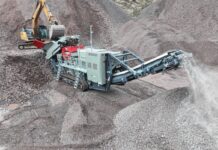Gareth Holden, Scotland’s depot manager for Taylor Construction Plant Ltd (TCP), gives an update on how the industry in Scotland is embracing hydrogen fuel cell/battery plant equipment and discusses the challenges that lie ahead
THE shift from diesel to cleaner energy products must happen if the UK is to end its contribution to global warming by 2050 and bring all greenhouse gas emissions to net zero. This means a huge opportunity for the manufacturers of energy efficient plant equipment which are powered by sustainable fuel – we already have these innovations on the market which are primarily battery or solar powered hybrid products.
If we are to eliminate the use of diesel generators, then the construction industry will need to embrace alternative solutions such as hydrogen fuel cell.
In the absence of mains electricity, fuel cell can be used for many different applications including temporary lighting, CCTV, environmental monitoring, portable power and welfare units. A hydrogen fuel cell generator produces electric power by combining hydrogen with atmospheric oxygen. The only emission from these cells is water vapour, and they are virtually silent in operation which is a big advantage when complying with Section 61 of the Control of Pollution Act.
With zero impact on air pollution levels at point of delivery, zero noise pollution and no risk of fuel spill, hydrogen fuel cell power provides the solution to many problems encountered on site.
Perhaps the biggest barrier to entry for hydrogen fuel cell is cost, but unlike hybrid solar/diesel options, no ‘oil and filters’ servicing is required which reduces overall hire costs. Also, a hydrogen fuel cell generator is very efficient and will only produce the required amount of power, whereas a diesel generator releases more energy than is sometimes needed for lower power jobs. The other good news is that with the huge increase in gas production and uptake, economies of scale will in time inevitably reduce the cost of hydrogen.
As members of the Scottish Hydrogen and Fuel Cell Association (SHFCA) and Hydrogen London, TCP is very active in promoting the H2 economy throughout the UK and work with key partners (BOC Linde/Intelligent Energy) and customers to continuously develop and innovate with new products and applications. The drive towards net zero targets in Scotland for 2045 has generated huge interest and demand with early adopters already now fully committed to using the H2 range as the first choice rather than using older diesel plant.
In 2014, TCP launched the Ecolite TH200 LED light tower which was used to light up the construction site of the new Aberdeen Exhibition and Conference Centre (AECC). The placement of the light towers was led by Aberdeen City Council which saw the product in action at the Shell Eco-Marathon. The Ecolite TH200 LED lighting tower has been developed in partnership with BOC, a member of the Linde Group, providing a solution to noise and air pollution. The light tower also uses Prismatic Lens technology to prevent light pollution and unwanted glare.
TCP has also been working with Babcock with the trial of its hydrogen fuel cell product range including an off-grid CCTV solution. The hydrogen fuel cell CCTV tower produces zero carbon emissions (at point of delivery) and provides cost-effective temporary site security with remote monitoring and on-site recording.
Interestingly, enquiries for our fuel cell innovations haven’t all been construction related. Our products are also used in projects as part of a hybrid array alongside solar and wind power in remote or off-grid areas to extend runtime and guarantee back up power. For example, a leading broadband supplier has installed the Ecolite CH2 hydrogen fuel cell power units as an environmentally friendly way of running their broadband transmitters in remote areas. The film industry is also interested in hydrogen fuel cell for power generation because of its virtually silent operation.
The applications for hydrogen fuel cell generators are endless and are the perfect solution to replace a diesel generator which has a needless environmental impact as well as constant requirement for servicing.
They can also work in conjunction with a power pack as TCP has proved by combining its LGP 2500 Power Pack and ECO GH2 DC hydrogen fuel cell generator together to produce a clean air alternative to a 5kW diesel generator for off-grid applications.
The ECO GH2 DC generator, capable of a maximum output of 1kW, reliably backs up the LGP 2500, in the absence of mains power. Together this powerful duo can also be hybridised with Photovoltaic array (PV panels) to power construction equipment such as a welfare cabin.
It is undoubtedly an exciting time for hydrogen fuel cell, and we are seeing an increase in hire agreements for our CCTV and lighting tower products especially from rail projects.
And finally, we are very excited that TCP has been shortlisted for the VIBES – Scottish Environment Business Awards in both the ‘Innovating Scotland’ and ‘Product Scotland’ categories. We are delighted to be recognised by such a prestigious event and look forward to the awards ceremony in November.












